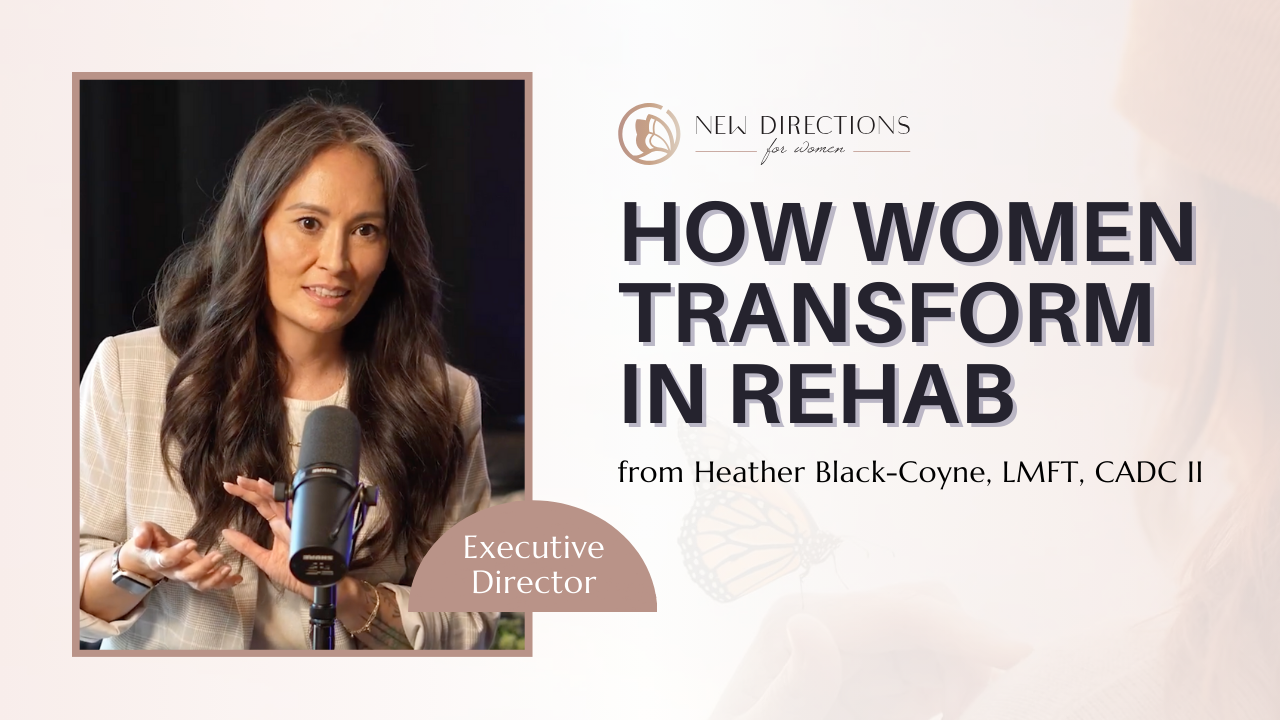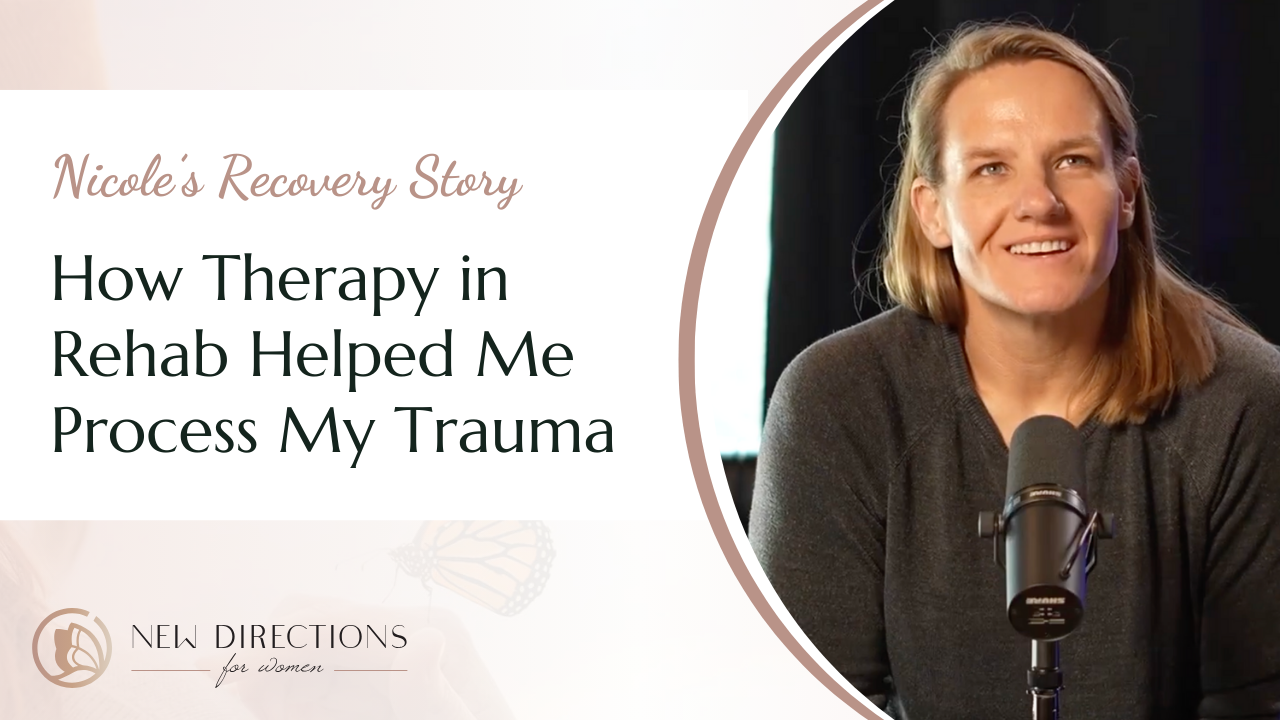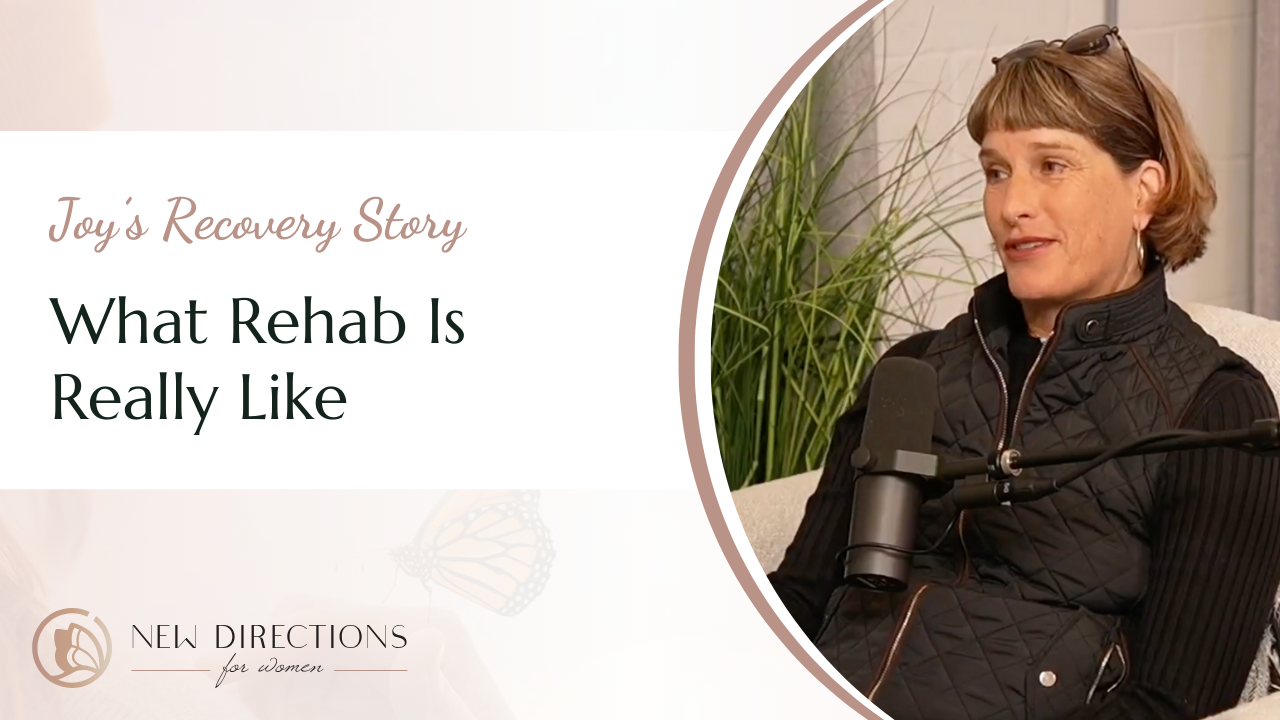Behavioral Addictions Are Often Substituted For A Drug or Alcohol Addiction
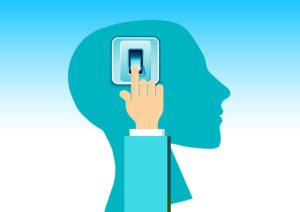
Let’s be honest. Getting sober is hard work! It is uncomfortable. It is unfamiliar. It can even be downright terrifying. After spending months or years relying on a substance to cope with life, facing life on its own terms in sobriety can just feel…well…weird! To cope with this weirdness, many people in recovery start trading one addiction for another.
In fact, behavioral addictions are quite common among those who are newly sober. A behavioral addiction (also called a “process addiction”) is defined as “a compulsion to continually engage in behaviors despite the negative impact it has on one’s health or daily life.”
Being trapped in the cycle of addiction affects women very profoundly. It never feels good – no matter what you are addicted to. Let’s talk more about behavioral addictions and how you can avoid trading one addiction for another.
Behavioral Addictions That Are Commonly Substituted for Drug or Alcohol Addiction
Here are some of the most popular addictions people in recovery substitute for their addiction to drugs or alcohol:
- Gambling (going to the casino, buying scratch tickets, going to poker parties)
- Sex (having sex with random people, having multiple partners)
- Food (binge-eating, overloading on sweets or junk food)
- Romance (feeling like you have to be in a relationship to feel whole)
- Working (becoming a workaholic and putting in too many stressful hours)
- Internet (staying glued to social media sites, spending too much time online)
- Pornography (obsessively looking at porn)
- Shopping (compulsively spending money buying things you don’t need)
- Gaming (playing video games)
- Risky behavior (regular thrill-seeking activities like skydiving, for example)
The truth is, when you engage in a behavior or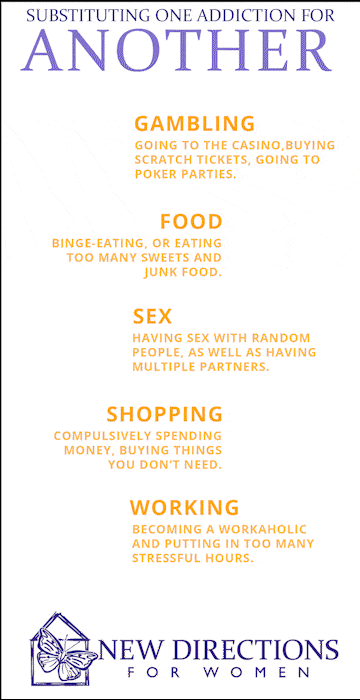 activity that begins to dominate your time, finances, attention, or thoughts – you are in a danger zone. People in recovery from a substance use disorder are particularly susceptible to behavioral addictions.
activity that begins to dominate your time, finances, attention, or thoughts – you are in a danger zone. People in recovery from a substance use disorder are particularly susceptible to behavioral addictions.
Believe it or not, you can feel just as powerless over a behavioral addiction as you can to an addiction to drugs or alcohol. Likewise, any addiction can cause your life to become unmanageable once it gets out of control.
This is why it is best to avoid behavioral addictions wherever possible or stop the behavior as soon as you realize that it has become a problem in your life.
Suggestions for Promoting Recovery in Your Life Instead of More Addiction
In recovery, you have to be vigilant. Your mind will naturally gravitate toward behaviors that provide instant gratification. As a person with a history of addiction, your mind has been trained to seek out a quick fix. It takes time, dedication, and self-discipline to break this pattern.
In sobriety, you want to promote recovery in all areas of your life. This means consciously choosing to pursue activities that will allow you to create the best version of yourself.
Here are ten activities that you can do to help you avoid replacing one addiction with another:
# 1 Exercise and Get Those Endorphins Pumping
One of the main reasons why people in recovery substitute one addiction for another is because they are depressed. This is to be expected in early recovery.
Continued abuse of drugs and alcohol depletes the brain of the so-called “feel good” chemicals in the brain. These include serotonin and dopamine, which regulate mood and produce feelings of contentment.
One of the ways you can avoid substitution is to get your body moving. You don’t have to join a gym or buy fancy workout equipment to enjoy the benefits of exercise.
Walking 20 to 30 minutes, three to four times a week will do the trick. Your brain will begin producing endorphins, which will combat depression and keep you from engaging in unhealthy behaviors.
# 2 Get Support at 12-Step Meetings
When you attend a meeting at Alcoholics Anonymous or Narcotics Anonymous, you will find that many other people in recovery have experience with replacing one addiction with another.
Share about your struggles in a meeting. Ask other recovering people about solutions that worked for them. You will be amazed at the support you will find if you reach out for help at a 12-step fellowship.
# 3 Find a Hobby You Enjoy
 Getting sober leaves newly recovering people feeling as if they have too much time on their hands. Finding a hobby can give life meaning, purpose, and direction.
Getting sober leaves newly recovering people feeling as if they have too much time on their hands. Finding a hobby can give life meaning, purpose, and direction.
Instead of trading one addiction for another, you can make the choice to engage in a healthy activity that promotes self-esteem, rebuilds confidence, and boosts mood.
There is an unlimited number of hobbies you can pursue instead of acting out with toxic behaviors. Go to a craft store and find something that you think you might enjoy (like needlepoint, painting, woodworking, or scrapbooking). Join a hiking group and explore local parks. Find a chess club. Start reading. Get into gardening. The options are endless.
# 4 Volunteer Your Time
Volunteering is a great way to avoid substituting one addiction for another. There are thousands of organizations out there that would greatly benefit from the donation of your time. Spend your energy on making a positive difference in the world. This will keep you focused on helping those in need, which will get you out of yourself. This can also help you avoid the trap of behavioral addiction.
Not sure where to volunteer? This list might give you some ideas.
# 5 Spend Time in Meditation
Recovery is a spiritual endeavor. Even if you do not believe in God or consider yourself a spiritual person, you can greatly benefit from incorporating the practice of meditation into your daily life (as well as other holistic practices like yoga).
Meditation teaches you to be more mindful of your mind, body, and soul. Studies have shown that just 15-30 minutes of daily meditation helps relieve anxiety and depression. It is also a great stress reliever. Meditation gives you access to higher consciousness, which allows you to feel more connected to yourself, others, and the world around you.
Spending time in meditation will greatly reduce the likelihood that you will substitute a behavioral addiction for your addiction to drugs or alcohol.
#6 Journal
One great way to slow down your compulsive behaviors and reflect on yourself is to journal. Journaling is a healthy life tool because it helps you express your inner thoughts and emotions. Thus, journaling acts as both a stress-reliever and an emotional outlet.
Having an emotional outlet like journaling while in recovery is especially beneficial if you’ve just finished your treatment and are no longer going to therapy as often. In fact, you may not even realize how you feel about a situation until you stop and journal about it.

Every morning, try journaling about whatever thoughts pop into your mind. You should also try to write down some things that you are grateful for each morning. Doing these things will help you start your day off on the right note, which will increase your chances of avoiding trading one addiction for another.
#7 Eat A Healthy, Well-Balanced Diet
It’s true, you are what you eat. Your diet is one of the key things that affect the way you feel, sleep, and operate. If you eat junk food all day, you will feel sluggish and slow. On the other hand, if you eat a balanced, plant-based diet each day, you will feel healthy and ready to take on the world. When you’re fueled by a healthy diet, you will not even need to trade in one addiction for another.
#8 Sleep
Another key healthy behavior that a person in recovery should utilize is sleeping. Without the proper hours of sleep each night, your mind will not operate at its best. Making sure that you’re not trading one addiction for another is already hard enough on the mind of a former addict. Thus, why make it harder on yourself by not getting enough sleep and not having your brain function at its best.
Getting enough sleep each night is not only beneficial to the mind, but it is also beneficial to the body of a former addict. This is because it is while you’re sleeping that your body heals itself from past toxins. As a former addict, your body is still damaged from all the abuse you put it through while suffering from addiction. Therefore, it is imperative that you receive your full seven to 10 hours of sleep a night.
Also, when you get enough sleep each night, you are in a better mood. The saying “I woke up on the wrong side of the bed” didn’t come from nowhere. By being in a better mood due to sleep, you will not start replacing one addiction with another.
#9 Spend Time With Family and Friends That Are a Good Influence
Humans are social creatures by nature. Therefore, we all need to spend time with the people we love and care about to feel alive and at our best.
As long as the people who you are choosing to spend time with do not misuse substances and are supportive of your sobriety journey, hanging out with them could be very good for you. In fact, having fun with the people you care about will help your brain produce more “feel-good” chemicals. If you are already feeling emotionally fulfilled through the love of your family and friends, you will not need to trade one addiction for another one.
#10 Practice Self-Care
One way to restimulate your mind and body is to take care of yourself. You’ve already been through a lot with your addiction. So, when you are feeling down or bored, why not treat yourself to an at-home self-care day? You deserve it! Plus, practicing self-care can help give you the strength and confidence to avoid trading one addiction for another.
What To Do If You Already Have a Behavioral Addiction
If you believe you have an addiction to a behavior or activity, don’t panic. Just like you got sober and gave up drugs and alcohol, you can also break the cycle of behavioral addiction.
If you are working a 12-step program, talk to your sponsor about your situation. She will be able to give you some guidance about how you can get back on track and stop trading one addiction for another. Remember, there is no shame in having an addiction. Just take things one day at a time and remember that recovery is possible.

